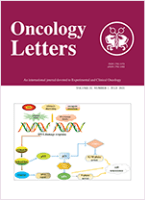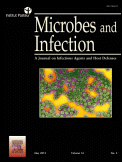
Infectious Agents and Cancer
Scope & Guideline
Unraveling the complex interplay of infectious agents and oncology.
Introduction
Aims and Scopes
- Impact of Infectious Agents on Cancer Development:
The journal consistently publishes studies examining how various infectious agents, particularly viruses like HPV, EBV, and HBV, contribute to the initiation and progression of malignancies. This includes exploring viral mechanisms and their interactions with host cellular pathways. - Clinical and Epidemiological Research:
The journal emphasizes clinical studies that assess the prevalence, risk factors, and outcomes of cancer patients with concurrent infections. This includes observational studies, case reports, and epidemiological surveys that inform public health strategies. - Innovative Diagnostic and Therapeutic Approaches:
Research focusing on novel diagnostics and therapeutic interventions for cancer related to infectious agents is a core area. This includes studies on vaccine efficacy, screening methods, and treatment protocols. - Interdisciplinary Studies:
The journal promotes interdisciplinary research that integrates oncology, virology, immunology, and public health, highlighting the complex interactions between infectious diseases and cancer. - Global Health Perspectives:
There is a consistent focus on global health issues, particularly in resource-limited settings. The journal addresses disparities in cancer care and prevention strategies in different geographical regions, particularly in Africa and Asia.
Trending and Emerging
- HPV and Cervical Cancer Research:
There is a significant uptick in studies focusing on HPV, particularly in relation to cervical cancer screening, vaccination, and genotype distribution. This reflects a growing awareness of the need for effective prevention strategies. - Impact of COVID-19 on Cancer Care:
Research examining the effects of the COVID-19 pandemic on cancer diagnosis, treatment, and patient outcomes has surged, highlighting the pandemic's impact on healthcare systems and patient management. - Integration of AI and Novel Technologies in Diagnostics:
Emerging studies are increasingly utilizing artificial intelligence and advanced diagnostic techniques, such as next-generation sequencing, to improve screening and detection of HPV and other oncogenic pathogens. - Microbiota and Cancer Relationships:
The relationship between microbiota and cancer is gaining traction, with studies investigating how microbial communities may influence cancer progression and therapeutic responses. - Longitudinal and Cohort Studies on Cancer Survivorship:
Research focusing on long-term health outcomes and survivorship in cancer patients, especially those with viral infections, is on the rise, reflecting a growing interest in holistic patient care.
Declining or Waning
- Non-Viral Infectious Agents and Cancer:
There has been a noticeable decrease in publications exploring the role of non-viral infectious agents (e.g., bacteria and parasites) in cancer development, indicating a potential waning interest or funding in this area. - Cancer Types Outside HPV and HBV Associations:
Research focusing on cancers unrelated to HPV or HBV, such as those associated with less well-studied pathogens, has become less frequent. This suggests a narrowing of focus towards more established associations. - Basic Mechanistic Studies:
There seems to be a decline in purely basic science studies investigating the cellular and molecular mechanisms of how infectious agents lead to cancer, as the journal shifts emphasis towards clinical and translational research. - Historical Epidemiological Studies:
Older epidemiological studies that do not incorporate contemporary data or new methodologies are less common in recent issues, suggesting a move towards more current and relevant epidemiological research.
Similar Journals

Journal of Clinical Virology Plus
Exploring the frontiers of viral diagnostics and therapies.The Journal of Clinical Virology Plus, published by Elsevier, is an essential resource for researchers and professionals in the fields of virology and infectious diseases. Launched in 2021, this journal aims to bridge the gap between clinical research and application, fostering a deeper understanding of viral pathogenesis, diagnostics, and therapeutic strategies. With an ISSN of 2667-0380, this open-access journal brings cutting-edge findings to the global scientific community, facilitating the rapid dissemination of knowledge critical for advancing public health. Positioned in the Q3 category for both Infectious Diseases and Virology in 2023, its ranking reflects its growing influence and relevance in the academic landscape. The journal strives to support innovative research, collaborative studies, and comprehensive reviews that address contemporary challenges in clinical virology. As it converges through the years from 2021 to 2024, Journal of Clinical Virology Plus aims to be a central hub for vital discussions and breakthroughs in this dynamic field.

JOURNAL OF CANCER RESEARCH AND CLINICAL ONCOLOGY
Connecting Research and Practice in the Fight Against Cancer.JOURNAL OF CANCER RESEARCH AND CLINICAL ONCOLOGY, published by Springer, is a prestigious peer-reviewed journal dedicated to advancing the fields of cancer research and clinical oncology. With an impact factor reflecting its significance within the academic community, the journal operates under a rigorous quality standard and offers a wealth of knowledge spanning from 1979 and continuing through 2025. With its comprehensive scope, it encompasses a wide array of topics including novel therapeutic strategies, clinical trials, and cutting-edge research methodologies, making it an essential resource for researchers, practitioners, and students alike. The journal’s category quartiles highlight its competitive edge, ranking Q2 in Cancer Research and Q1 in Medicine (miscellaneous) as of 2023. This positioning underscores its role at the forefront of oncology discourse. Through this journal, contributors and readers alike engage with impactful research that informs clinical practices and enhances patient care in oncology. Access to the journal’s content, although not open access, ensures curated and high-quality insights available to the academic and professional community.

Acta Naturae
Fostering Scientific Dialogue in Biochemical ResearchActa Naturae is a peer-reviewed scientific journal published by the Russian Federation Agency for Science & Innovation, focusing on the dynamic fields of Biochemistry, Biotechnology, Molecular Biology, and Molecular Medicine. Launched in 2013, the journal has established a solid reputation in the academic community, with its articles contributing to essential advancements and discussions within these disciplines. By 2023, it has achieved notable rankings—including Q2 status in Biotechnology and Q3 in Biochemistry, Molecular Biology, and Molecular Medicine—indicating its growing influence and relevance in the scientific literature. While currently operating under a non-open access model, Acta Naturae invites researchers, professionals, and students to engage with its comprehensive research reports and reviews that span the breadth of molecular life sciences. With the aim of facilitating scientific dialogue and innovation, this journal serves as a key resource for those seeking to stay at the forefront of molecular research.

ACTA VIROLOGICA
Exploring the evolving landscape of infectious diseases.ACTA VIROLOGICA, a key journal in the field of virology and infectious diseases, is published by FRONTIERS MEDIA SA in Slovakia, serving the global scientific community with groundbreaking research since its inception in 1957. This esteemed journal, identified by ISSN 0001-723X and E-ISSN 1336-2305, provides a platform for rigorous peer-reviewed articles that contribute significantly to our understanding of viral pathogens and their implications in medicine. Positioned within the Q3 category for both Infectious Diseases and Miscellaneous Medicine, and a Q4 category for Virology in 2023, ACTA VIROLOGICA offers crucial insights into the evolving landscape of virology research. With its robust accessibility options, this journal appeals to a diverse readership, including researchers, healthcare professionals, and students, fostering a collaborative environment to advance the field of virology. The editorial objective is to enhance the catalog of knowledge pertaining to viruses, promoting innovative approaches in prevention, diagnostics, and treatment. Located at AVENUE DU TRIBUNAL FEDERAL 34, LAUSANNE CH-1015, SWITZERLAND, ACTA VIROLOGICA continues to be a vital resource in the collective efforts to combat viral disease challenges.

Asian Biomedicine
Bridging Knowledge Gaps in Biomedical SciencesAsian Biomedicine, published by WALTER DE GRUYTER GMBH, serves as a crucial platform for disseminating pioneering research in the field of biomedical sciences. Established in 2008, this journal has carved its niche in the landscape of academic publishing, concentrating on a diverse array of topics within biochemistry, genetics, and molecular biology, as well as medicine. Though it currently holds a Q4 ranking in its category, it is dedicated to fostering academic discussions and advancing knowledge among researchers, professionals, and students alike. While the journal features a variety of access options, it is committed to ensuring that its content remains relevant and impactful, with an emphasis on the latest developments and research trends. The editorial board encourages submissions that address pressing biomedical issues, thus empowering contributors to engage meaningfully with the scientific community. With a broad international scope and a focus on quality, Asian Biomedicine is poised to play an increasingly important role in the advancement of biomedical research in Asia and beyond.

Oncology Reviews
Advancing the Frontier of Cancer ResearchOncology Reviews, founded in 2007 and published by FRONTIERS MEDIA SA, is a leading open-access journal dedicated to advancing knowledge in the field of oncology and cancer research. With an Impact Factor reflecting its robust engagement in scholarly discourse, this journal maintains a prestigious standing, earning a Q2 ranking in Oncology and a Q3 ranking in Cancer Research as of 2023. Notably, it is indexed in Scopus, where it ranks #118 in Oncology and #98 in Cancer Research, highlighting its global reach and significance. The journal's open-access policy, in effect since 2012, ensures that high-quality research is accessible to all, fostering collaboration and wellness improvements worldwide. This commitment to accessibility and dissemination of pivotal research makes Oncology Reviews an essential resource for researchers, healthcare professionals, and students eager to contribute to and stay abreast of the latest innovations in cancer treatment and research.

Oncology Letters
Empowering Oncology with Groundbreaking DiscoveriesOncology Letters is a prominent academic journal dedicated to disseminating high-quality research in the fields of oncology and cancer research. Published by SPANDIDOS PUBL LTD and based in Greece, this journal has established a significant presence since its inception in 2010 and continues to contribute to the scientific community with a focus on both clinical and experimental oncology. Notably, it holds a respectable Q3 ranking in the categories of Cancer Research and Oncology as of 2023, highlighting its relevance and contribution to these critical fields. With a Scopus rank of #139/404 in Medicine – Oncology and #117/230 in Biochemistry, Genetics, and Molecular Biology – Cancer Research, Oncology Letters serves as a valuable platform for researchers, professionals, and students alike to explore emerging findings and innovative treatment approaches. Though it operates within a traditional subscription model, this journal prides itself on fostering accessible and impactful discourse in oncology, making it an essential resource for those committed to advancing cancer research and improving patient care.

BULLETIN DU CANCER
Illuminating the path to effective cancer therapies.BULLETIN DU CANCER is a pivotal academic journal dedicated to the field of oncology, providing a platform for innovative research and insights into cancer treatment and diagnostics. Published by Elsevier Masson, Corp Off in France, this journal has been a part of the scientific community since 1966, and is committed to sharing critical findings that influence clinical practices and improve patient outcomes. Despite its recent rankings placing it in the Q4 category for Cancer Research and Q3 for Hematology and other related fields, BULLETIN DU CANCER remains essential for those interested in the latest developments in cancer biology and treatment methodologies. With an emphasis on both basic and clinical research, it serves as a valuable resource for researchers, healthcare professionals, and students seeking to deepen their understanding in various dimensions of oncology. This journal is particularly relevant as it continues to spotlight emerging research trends and supports the global imperative to combat cancer more effectively.

BRITISH JOURNAL OF CANCER
Shaping the Future of Oncology Through Quality Scholarship.The British Journal of Cancer, published by SpringerNature, stands as a preeminent resource in the fields of Cancer Research and Oncology, with a distinguished history of publication dating back to 1947. With its Q1 rank in both categories for 2023, this journal is among the top-tier publications, offering cutting-edge research and insights into the biology, etiology, and treatment of cancer. The journal’s rigorous peer-review process ensures that readers are presented with high-quality studies that contribute to the advancement of cancer knowledge and clinical practice. Operating from the United Kingdom, it has garnered a notable impact factor and ranks impressively within Scopus, making it an essential publication for researchers, healthcare professionals, and students who are dedicated to understanding cancer's complexities. Access to the journal's articles is available in traditional formats, providing a versatile platform for disseminating pivotal research. As we move towards a future where cancer treatment and prevention remain crucial, the British Journal of Cancer continues to play a vital role in shaping the dialogue and discoveries within the oncology community.

MICROBES AND INFECTION
Fostering Global Collaboration in MicrobiologyMICROBES AND INFECTION is a premier academic journal published by Elsevier, dedicated to the dynamic fields of immunology, infectious diseases, and microbiology. With a notable impact factor reflective of its high-quality research contributions, the journal is categorized in the Q2 quartile across these fields as of 2023. Based in France and operating since 1999, MICROBES AND INFECTION offers a platform for researchers, professionals, and students to disseminate and access cutting-edge findings that drive innovation and knowledge in microbial and infectious disease research. The journal is ranked impressively within the Scopus database, securing ranks such as #16 in Microbiology and #33 in Infectious Diseases, underscoring its high relevance in the scientific community. Subscribers to the journal can expect an array of articles, reviews, and original research, all designed to advance understanding and improve clinical practices in the fight against infectious agents. With its ongoing commitment to open access options, MICROBES AND INFECTION continues to foster global collaboration and information sharing in the pursuit of addressing pressing microbiological challenges.